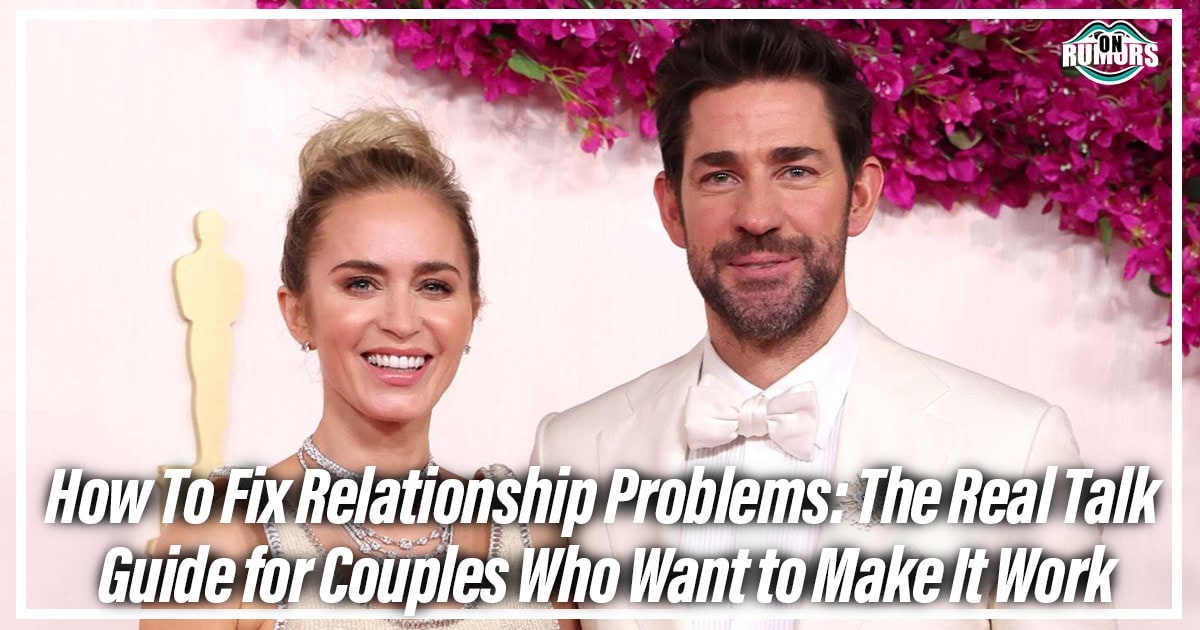Every relationship, no matter how perfect it looks on the outside, faces its share of struggles. Even couples who seem inseparable go through phases of tension, miscommunication, and emotional distance.
These challenges don’t mean the love is gone—they simply mean the relationship needs attention, intention, and effort.
Whether you’re dealing with long-distance relationship problems or struggling with daily frustrations at home, one truth remains: every relationship has its problems. But they can be fixed—with the right mindset, communication, and patience.
If you’ve found yourself wondering how to solve problems in a relationship without making things worse, or if you’re scared that the next fight might be the last, this guide is for you.

10 Main Causes of Relationship Problems: Why Couples Drift Apart
Before you can fix a relationship problem, you need to understand where it’s coming from. Most issues don’t just appear overnight—they build slowly, often unnoticed, until they feel overwhelming. Knowing the root cause of your struggles is key to healing.
Let’s break down some of the most common causes of relationship problems:
1. Poor Communication
At the heart of nearly every relationship issue lies a breakdown in communication. When couples stop expressing their feelings, thoughts, and needs openly and honestly, misunderstandings pile up.
Silence becomes the enemy of connection. You might assume your partner should know what you’re thinking or feeling, but mind-reading doesn’t work in love. Clear, compassionate communication is essential—not just during arguments, but every day.
2. Emotional Disconnection
As relationships mature, it’s easy to fall into routines and stop nurturing emotional intimacy. You stop asking deep questions.
You stop sharing your fears or dreams. And slowly, you drift apart—not because you don’t love each other, but because you’re no longer connecting in meaningful ways. Emotional neglect is just as damaging as physical distance.
3. Unresolved Past Conflicts
When couples sweep issues under the rug instead of addressing them, those problems don’t disappear—they fester.
Resentment builds over time when apologies are missing or healing doesn’t happen. You might find yourselves fighting about one thing, but it’s really about five things you never properly dealt with.
Unresolved conflict becomes emotional clutter, and it eventually weighs the relationship down.
4. Lack of Physical Intimacy
Physical affection is a form of emotional language. It’s not just about sex—it’s about touch, closeness, and shared vulnerability.
A lack of physical connection can make a partner feel unwanted or unloved, even if you still care deeply. Sometimes, couples stop being affectionate due to stress, body image issues, or unspoken fears, but the result is the same: distance.

5. Unmet Expectations
Every person brings unspoken expectations into a relationship—how they expect love to look, how conflict should be handled, or what long-term goals should be.
When those expectations aren’t met or even discussed, disappointment follows. You might feel let down without fully understanding why.
The solution lies in clearly communicating expectations and being open to compromise.
6. External Stressors
Money problems, family drama, career changes, or health issues can put enormous pressure on a couple.
In these moments, partners sometimes take their stress out on each other or disconnect emotionally. If you don’t face external stress as a team, it can drive a wedge between you.
7. Trust Issues
Whether due to past relationships or something that happened between the two of you, a lack of trust is a ticking time bomb.
It can lead to jealousy, controlling behavior, or emotional withdrawal. Without rebuilding trust, even small conflicts become huge arguments, and long-term peace feels impossible.
8. Incompatible Conflict Styles
Some people shut down when things get tense. Others raise their voices. If your conflict styles don’t align, fights can escalate quickly.
One person may want to talk it out immediately, while the other needs space. If you’re not aware of these differences, your attempts to fix things can make them worse.
9. Neglecting Relationship Maintenance
Relationships need attention, just like anything else worth having. When one or both partners stop putting in the effort—no more date nights, no more small surprises, no more check-ins—it sends a silent message: this isn’t a priority anymore.
Even a good relationship can fall apart if it’s left unattended for too long.
10. Mismatched Values Or Goals Over Time
People grow and change—and sometimes not in the same direction. If your values, dreams, or beliefs start to drift apart, you may find yourselves no longer aligned.
That doesn’t mean the relationship must end, but it does mean honest conversations need to happen. You have to ask: are we still building the same future?
Understanding the root of your conflict is not about assigning blame. It’s about bringing awareness, so healing becomes possible.
Once you and your partner identify what’s really causing the distance between you, you can start rebuilding—together, intentionally, and with love.

10 Real Ways to Fix Relationship Problems
Let’s explore how to fix relationship problems in a way that helps both partners feel heard, valued, and hopeful again.
1. Understand That Every Relationship Has Its Problems
The first step in healing is acknowledging the reality: no couple is problem-free. Even the strongest, happiest partnerships experience moments of disconnect, disagreement, and doubt. Expecting perfection sets you up for disappointment.
Instead, approach problems as part of the journey. You and your partner are two different people with your own stories, triggers, and emotional languages.
It’s natural that clashes will occur. What matters is not the presence of conflict but how you handle it together.
Accepting this helps you drop the blame game and focus on mutual growth. It creates a more forgiving environment where mistakes aren’t relationship-enders but learning moments. This shift in mindset builds resilience—something all lasting love needs.
2. Communicate With Curiosity, Not Criticism
One of the most common answers to the question of how to discuss relationship problems is “talk it out.” But it’s not just about talking—it’s how you talk. Criticism and judgment shut your partner down. Curiosity, on the other hand, opens them up.
Try asking, “Can you help me understand how you feel about this?” instead of “Why do you always act like that?” The first invites closeness; the second causes distance. Use open-ended questions. Listen not to reply, but to understand.
Healthy communication means being willing to hear things you may not like. It means creating a safe space where vulnerability can exist without fear.
When you shift the tone of your conversations, you shift the energy of your relationship.
3. Learn How to Solve Problems in a Relationship Without Blaming
Blame is a wall between two hearts. When you approach conflict with an attitude of “you always” or “you never,” your partner feels attacked—and naturally becomes defensive.
Instead of pointing fingers, use “I” statements. Say, “I feel sad when we don’t spend time together,” instead of “You never care about me.” This keeps the focus on your feelings rather than your partner’s flaws.
Work together to identify the root issue. Is it unmet expectations? Stress from work? A deeper emotional wound? Once you name the real problem, you can start solving it as a team instead of fighting each other.
4. Address Long Distance Relationship Problems with Extra Intention
Distance makes communication harder, but it also makes it more essential. Long distance relationship problems often stem from unmet emotional needs and a lack of presence. So presence must be created.
Set intentional routines—daily check-ins, scheduled video dates, surprise texts or letters. Share your schedules so you feel included in each other’s lives.

When visits aren’t possible, make shared goals: countdowns, books to read together, or dreams to build toward.
Long distance requires more than love—it needs trust, creativity, and constant effort. But when both partners are committed, the relationship can thrive even across the miles.
5. Rebuild Emotional Intimacy Before Solving Surface Problems
Sometimes, we argue about dishes or text replies, when what we’re really missing is connection. Emotional intimacy is the glue of any relationship, and when it’s gone, even small issues feel like major threats.
Take time to reconnect emotionally. This might mean slowing down the problem-solving and focusing on emotional safety first.
Ask thoughtful questions like “What’s been heavy on your heart lately?” or “What do you need more of from me?”
Rebuilding emotional intimacy can feel vulnerable. But it also reopens the channel for compassion, humor, and affection—elements that help couples weather even the hardest storms.
6. Practice Active Listening and Reflective Understanding
Listening isn’t just hearing words—it’s tuning in to what’s behind them. Is your partner sad, scared, lonely, or tired? Are they reaching out in a clumsy way because they don’t feel safe?
Practice reflective listening.
After they speak, repeat what you heard in your own words: “So what I’m hearing is that you felt ignored when I didn’t call back.” This builds empathy and minimizes misunderstanding.
Active listening slows the conversation down. It replaces reaction with reflection. And most importantly, it shows your partner that their inner world matters to you.
7. Set Healthy Boundaries and Respect Them
Many relationship problems come from unclear or crossed boundaries. Maybe one partner feels smothered, while the other feels abandoned. Or one person struggles with a lack of privacy or independence.
Talk openly about boundaries: emotional, physical, social, and even digital. What feels safe for each of you? What feels too much or not enough?
Setting boundaries isn’t about pushing each other away—it’s about creating structure so love can flourish without resentment. When both people feel respected, trust deepens.
8. Stop Avoiding Tough Conversations
Avoiding problems doesn’t make them disappear—it just makes them grow. Silence creates distance, and distance becomes resentment. You might think you’re keeping the peace, but in truth, you’re planting seeds of disconnection.
Commit to having the hard conversations. Talk about unmet needs, fears, and even past pain. It might feel scary, but honesty—when done kindly—can be incredibly healing.
Use a calm time to talk, not when tempers are high. And always enter with the intention to understand, not attack. Tough conversations are where real intimacy is built.

9. Take Breaks from Arguing Before Damage Is Done
Sometimes, you need a time-out. Not to avoid the issue, but to prevent escalation. If things are getting too heated, say, “Can we take a pause and come back to this in 20 minutes?”
This gives both of you a chance to breathe, calm your nervous system, and gather your thoughts. It keeps the conversation from turning into a shouting match or saying things you’ll regret.
It’s not avoidance—it’s regulation. And regulated people solve problems more effectively.
10. Seek Relationship Problems Advice When You’re Stuck
You don’t have to do this alone. Whether it’s talking to a therapist, a trusted mentor, or even reading books on relationship psychology, outside perspectives can help untangle complex emotions.
A counselor can guide you on how to fix relationship problems with tools and insights you might not have thought of.
They can mediate tough conversations and teach you both how to listen, speak, and repair more effectively.
There’s strength in asking for help. It shows you care enough to fight for the love you’ve built.
Conclusion: Healing Is Hard—But So Is Letting Go
Every couple faces challenges. That’s not a sign of failure—it’s a sign of being human. The question isn’t if you’ll have problems, but how you’ll face them together.
If you’ve wondered how to fix relationship problems without losing yourself or your partner, the answer lies in patience, love, and open-hearted effort.
Whether you’re struggling with long-distance relationship problems, daily miscommunications, or years of built-up pain, healing is possible.
It won’t happen overnight, but with time and truth, you can build something even stronger than before.
Your love is worth fighting for—and this is how you fight for it with grace.

